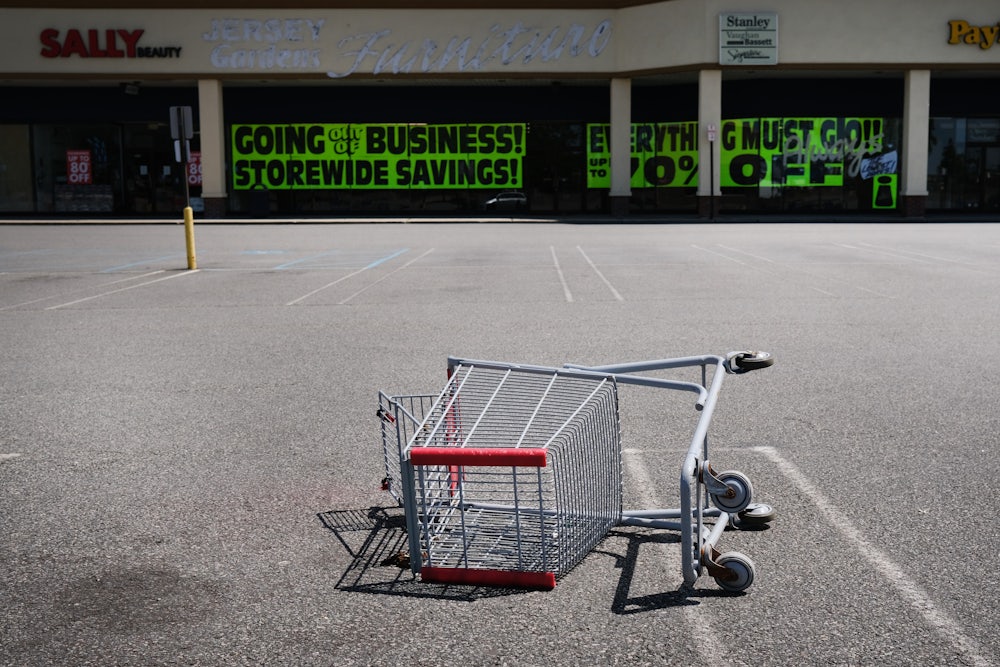Labor Day is here, which means it’s time to buy stuff. The Today Show has the latest on the “Home Decor Sales You Can’t Miss.” USA Today excitedly reported that “Home Depot’s huge Labor Day sale has arrived.” The New York Post is here to inform you that Wayfair is slashing prices up to 70 percent! This is the worker’s holiday in the United States—a Black Friday for the dying days of summer. Most years, this doesn’t really register. But the pandemic, a depressing engine of clarity, has made the Labor Day sales push harder to look past.
Daily infection rates in the U.S. are double the rates in spring and early summer, and the death rate has held steady at roughly 1,000 per day for the past six weeks. The unemployment rate, while down since July, still sits at 9.1 percent. Amazon delivery drivers, trying to gain a slight edge on claiming new jobs and make ends meet, are sticking their cell phones in trees while the company’s corporate office is hiring for a position to help it root out “labor organizing threats.” Bartenders and servers are still being accosted by anti-mask customers, all while chains and ownership groups institute mass layoffs. Public school teachers—who entered the pandemic fresh off a years-long push for more resources—are being called back into schools where some classrooms have no windows. The American economy has been built for a very small, very wealthy segment of society. This has always been a moral and material disaster, but its reach in the pandemic is widening and the violence of impact has become all the more glaring.
As politicians have either cozied up or turned a blind eye to the wealthiest in America, billionaires have made off with profits that outsize many state budgets. Private equity firms, fresh off gutting staffs at nursing homes, have reaped the profits of short-selling commercial real estate securities, all while corporations roll back the temporary pay increases retail workers relied on at the start of summer. But the message to workers over the past five months has mainly been constant reminders that our usefulness to our nation in this time is our willingness to return to unsafe job sites and our ability to spend our paychecks. This year, Labor Day feels painfully familiar and somehow new. Worse.
Writing for Teen Vogue last year, New Republic contributor Kim Kelly traced the holiday’s origins back to the late nineteenth century, when the wealthy of the fading Gilded Age needed to appease the working class. But globally, the worker’s holiday is May Day, whose origins lie in the 1886 Haymarket Square bombing and subsequent executions of labor organizers in Chicago. American workers and labor organizers have a long history and tradition of uniting to combat corrupt management, corporations, and governments. Eight-hour days. Forty-hour workweeks. Weekends. These are all political victories that required decades of organizing and oftentimes physical confrontation and sacrifice. The American construction of Labor Day isn’t about any of that. It’s not the worker organizer, or the worker militant being celebrated—it’s the worker-consumer.
Now it’s hard to think about anything else. Reading the news, one is reminded that, for America’s billionaires, the pandemic hasn’t been so much a tragedy as it is a half-trillion-dollar investment opportunity. One can’t watch an NBA bubble game (on a Disney- or AT&T-owned network) without listening to American Express beg the audience to “Shop Small” during these tough times. The dissonance has always been staggering; now it’s annihilating. Workers didn’t need a national health crisis to be shown in grotesque detail how poorly America’s social safety nets have been set up, but it arrived all the same.
The question is what workers do in response. From the beginning of the pandemic, workers at companies like Amazon and Instacart stood against demands from their employers to work through unsafe conditions. New York teachers were on the verge of striking as the city considered, and then finally decided against, sending them back into schools without ample safety measures being taken. Teachers in Arizona followed through on their sick-out threat when their school district ignored them. Considerations for a general strike have been stoked repeatedly. There’s a unifying thread: This is not how things should be.
The coming and going of another Labor Day doesn’t change or mean much. But outside the frame of the advertorials and listicles about sales, there are stories in those same papers about what it really is to be a worker in this country right now. Those are the daily reminders of what workers have fought for and won—and what we all still deserve but continue to be denied.
